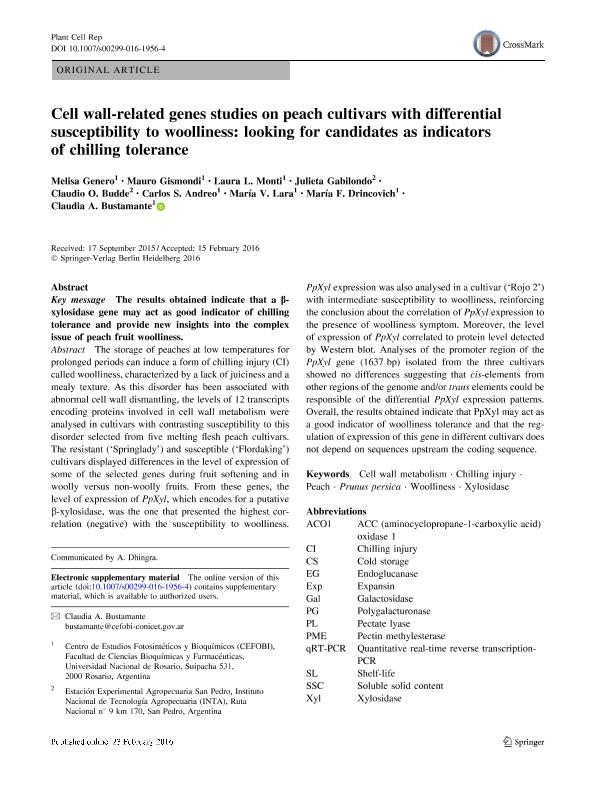Artículo
Cell wall-related genes studies on peach cultivars with differential susceptibility to woolliness: looking for candidates as indicators of chilling tolerance
Genero, Melisa; Gismondi, Mauro ; Monti, Laura Lucía
; Monti, Laura Lucía ; Gabilondo, Julieta; Budde, Claudio O.; Andreo, Carlos Santiago
; Gabilondo, Julieta; Budde, Claudio O.; Andreo, Carlos Santiago ; Lara, Maria Valeria
; Lara, Maria Valeria ; Drincovich, Maria Fabiana
; Drincovich, Maria Fabiana ; Bustamante, Claudia Anabel
; Bustamante, Claudia Anabel
 ; Monti, Laura Lucía
; Monti, Laura Lucía ; Gabilondo, Julieta; Budde, Claudio O.; Andreo, Carlos Santiago
; Gabilondo, Julieta; Budde, Claudio O.; Andreo, Carlos Santiago ; Lara, Maria Valeria
; Lara, Maria Valeria ; Drincovich, Maria Fabiana
; Drincovich, Maria Fabiana ; Bustamante, Claudia Anabel
; Bustamante, Claudia Anabel
Fecha de publicación:
06/2016
Editorial:
Springer
Revista:
Plant Cell Reports
ISSN:
0721-7714
Idioma:
Inglés
Tipo de recurso:
Artículo publicado
Clasificación temática:
Resumen
Key message: The results obtained indicate that a β-xylosidase gene may act as good indicator of chilling tolerance and provide new insights into the complex issue of peach fruit woolliness. Abstract: The storage of peaches at low temperatures for prolonged periods can induce a form of chilling injury (CI) called woolliness, characterized by a lack of juiciness and a mealy texture. As this disorder has been associated with abnormal cell wall dismantling, the levels of 12 transcripts encoding proteins involved in cell wall metabolism were analysed in cultivars with contrasting susceptibility to this disorder selected from five melting flesh peach cultivars. The resistant (‘Springlady’) and susceptible (‘Flordaking’) cultivars displayed differences in the level of expression of some of the selected genes during fruit softening and in woolly versus non-woolly fruits. From these genes, the level of expression of PpXyl, which encodes for a putative β-xylosidase, was the one that presented the highest correlation (negative) with the susceptibility to woolliness. PpXyl expression was also analysed in a cultivar (‘Rojo 2’) with intermediate susceptibility to woolliness, reinforcing the conclusion about the correlation of PpXyl expression to the presence of woolliness symptom. Moreover, the level of expression of PpXyl correlated to protein level detected by Western blot. Analyses of the promoter region of the PpXyl gene (1637 bp) isolated from the three cultivars showed no differences suggesting that cis-elements from other regions of the genome and/or trans elements could be responsible of the differential PpXyl expression patterns. Overall, the results obtained indicate that PpXyl may act as a good indicator of woolliness tolerance and that the regulation of expression of this gene in different cultivars does not depend on sequences upstream the coding sequence.
Palabras clave:
Cell Wall Metabolism
,
Chilling Injury
,
Peach
,
Prunus Persica
,
Woolliness
,
Xylosidase
Archivos asociados
Licencia
Identificadores
Colecciones
Articulos(CEFOBI)
Articulos de CENTRO DE EST.FOTOSINTETICOS Y BIOQUIMICOS (I)
Articulos de CENTRO DE EST.FOTOSINTETICOS Y BIOQUIMICOS (I)
Citación
Genero, Melisa; Gismondi, Mauro; Monti, Laura Lucía; Gabilondo, Julieta; Budde, Claudio O.; et al.; Cell wall-related genes studies on peach cultivars with differential susceptibility to woolliness: looking for candidates as indicators of chilling tolerance; Springer; Plant Cell Reports; 35; 6; 6-2016; 1235-1246
Compartir
Altmétricas



